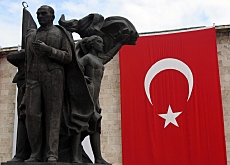Turkey marks 80 years of Swiss civil code

Swiss Justice Minister Christoph Blocher has spoken of his pride that Turkey adopted Switzerland's civil code 80 years ago - in a speech at Ankara University.
Ahead of the visit, swissinfo spoke to historian and Turkey expert Hans-Lukas Kieser about how the Islamic sense of justice and European legislation came together.
Blocher’s trip to Turkey comes at a time of strained relations between the two countries.
On October 4, 1926 the Swiss civil code came into force, without any major alterations, in Turkey.
This came two years after the Republic of Turkey under Atatürk had abolished the Ottoman caliphate, which had been in power for more than 600 years. In 1926 sharia law – Islamic legislation inspired by the Koran – was also abolished.
This had a fundamental effect not only on Turkish life but also on the country’s relationship with the Islamic world, according to Kieser, a history lecturer at Zurich University and president of the Swiss-Turkish research centre.
swissinfo: How did Turkey come to adopt a large part of Switzerland’s legislation 80 years ago?
Hans-Lukas Kieser: An important reason was that a brand new state was being created by a young elite – some of whom had studied in Switzerland.
The Swiss civil code was also considered to be the most modern, the most simply formulated, the most concise and with the greatest popular touch.
swissinfo: What changes did this “legal revolution” cause?
H.-L.K.: There were violent changes. Family law is to a certain extent the nucleus of society and this shift meant the complete abolition of the sharia tradition.
swissinfo: Have there also been changes concerning women’s rights?
H.-L.K.: Of course. Under traditional Islamic law women are seriously disadvantaged when it comes to inheritance or divorce and that changed at a stroke – even if it has been effective for only a part of society. This is because the “legal revolution” managed to take hold in the cities, but less so in the east of the country and out in the country.
swissinfo: Did the civil code’s introduction go smoothly or were there obstacles?
H.-L.K.: One of the largest obstacles is power being imposed from those at the top – in other words not a grass-roots democracy. In this respect there was resistance to this very authoritarian behaviour by the state not only from traditional Islamic groups but also from liberals.
Even though the civil code was widely accepted by the elite, its implementation took decades. It’s only recently that we’ve been able to talk of a more or less complete implementation.
swissinfo: Did the civil code cause differences of opinion between Turkey and sympathetic Islamic states?
H.-L.K.: The introduction of the civil code and the abolition of sharia law led to resistance, especially from Islamic thinkers and religious academics. These intellectuals considered that it could only lead to a decline of Islamic teaching.
swissinfo: The Turkish civil code was revised at the end of the 1980s. Did this lead to a greater religious influence?
H.-L.K.: No. It emphasises just how dramatic the legal revolution had been in this respect, as it is still holding up. The revision took place at the same time as that of the Swiss civil code. The Swiss federal court’s decisions and commentaries were even translated.
swissinfo: Can Blocher act as an “ice-breaker” for the frosty relations currently between Switzerland and Turkey?
H.-L.K.: I don’t know whether he can. But there is a great potential – because of the strong connection – to solve even the trickiest problems, even Turkey coming to terms with its history.
swissinfo-interview: Gaby Ochsenbein and Jean-Michel Berthoud
Despite having a long history, Swiss-Turkish relations have recently been strained. 2005 was an “annus horribilis”:
In March 2005 Swiss Foreign Minister Micheline Calmy-Rey visited Turkey and raised the sensitive issue of the massacre of Armenians in Turkey early last century.
In June the Swiss public prosecutor launched a criminal investigation against a Turkish historian in Switzerland who had denied the genocide, a violation of Switzerland’s anti-racism laws.
In July Turkey’s foreign minister, Abdullah Gül, described the Swiss investigation as “unacceptable” and “absolutely contrary to the principle of free speech”.
In August the Turkish authorities postponed a visit by Swiss Economics Minister Joseph Deiss citing agenda problems of his Turkish counterpart.
In November Switzerland beat Turkey in a vital World Cup playoff match, triggering ugly scenes between players.
80,000 Turks live in Switzerland.
In 2004, Swiss exports to Turkey were worth SFr1.9 billion ($1.45 billion), 17% more than in 2003.
Swiss imports from Turkey in 2004 came to $410 million.
Among Swiss firms established in Turkey are Novartis, Nestlé, ABB, Ciba, Roche, Givaudan and Syngenta.

In compliance with the JTI standards
More: SWI swissinfo.ch certified by the Journalism Trust Initiative












You can find an overview of ongoing debates with our journalists here . Please join us!
If you want to start a conversation about a topic raised in this article or want to report factual errors, email us at english@swissinfo.ch.